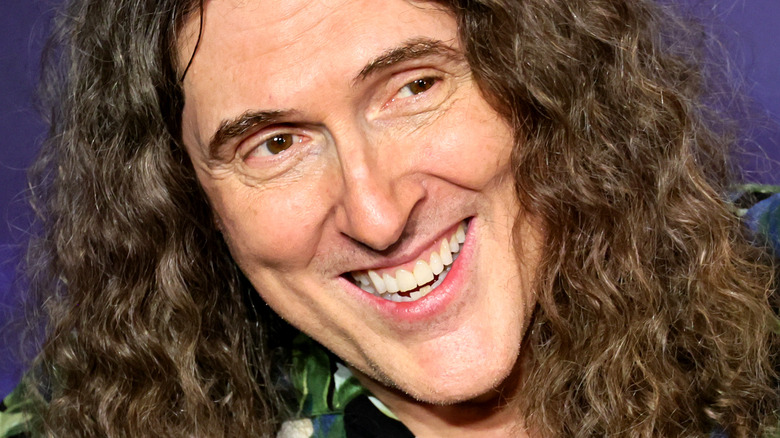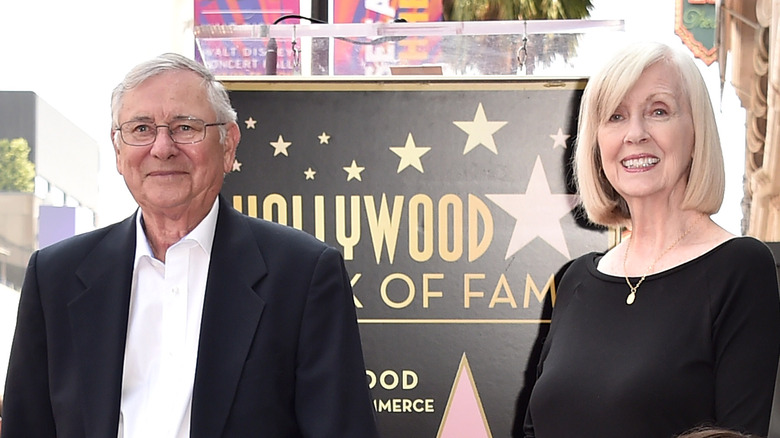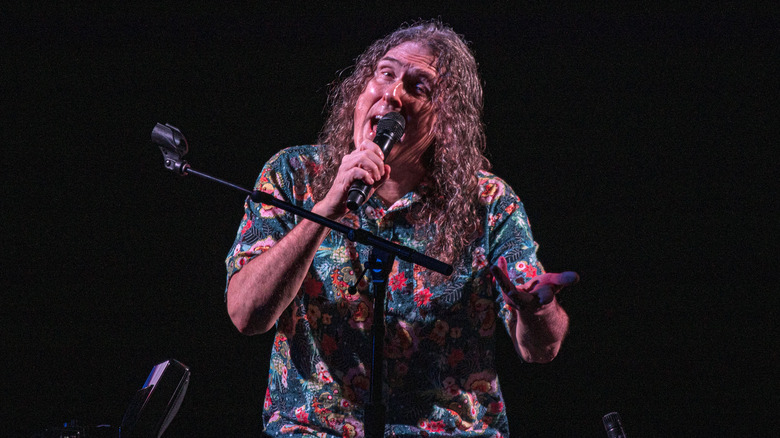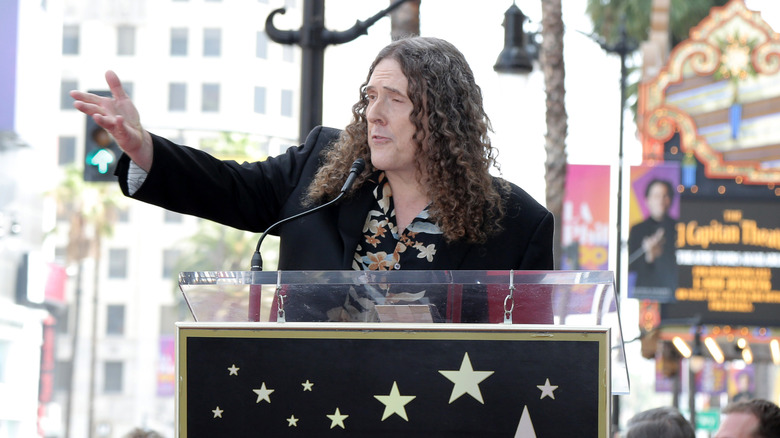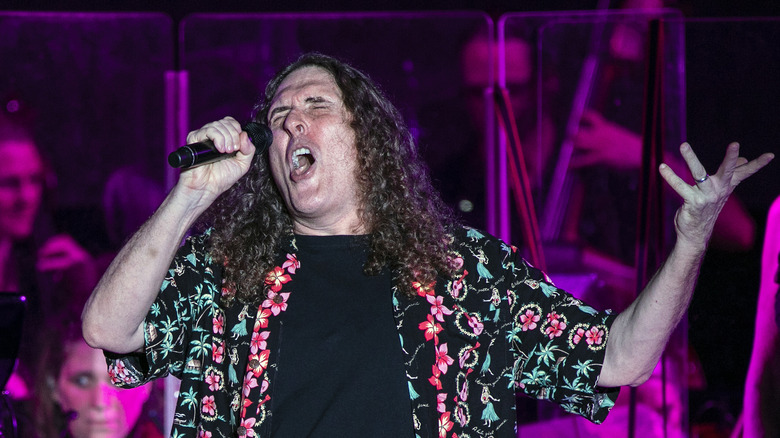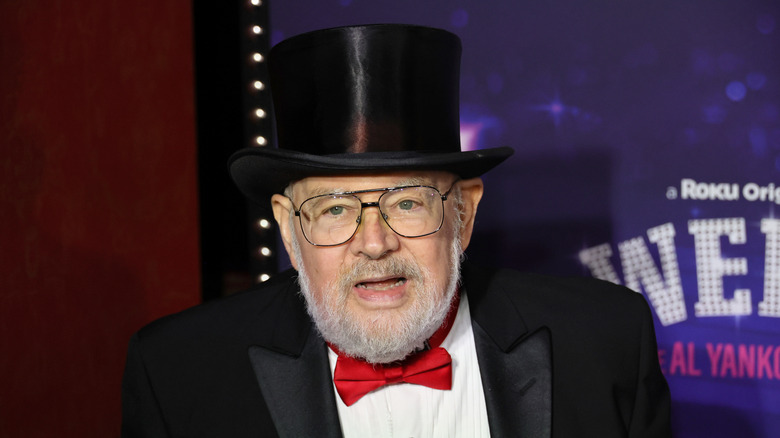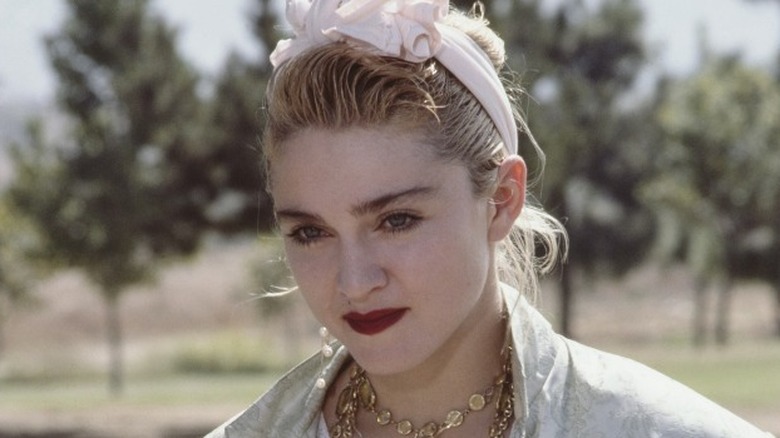What Weird: The Al Yankovic Story Actually Got Right About The True Story
It should come as no surprise that "Weird: The Al Yankovic Story" is not a conventional biography. Instead, it's a ridiculous parody that indulges every trite beat and hackneyed rhythm of the biopic genre. It takes the well-worn rise and fall narrative and loads it with farce, fantasy and meta references. What else would you expect from "Weird Al" Yankovic?
Before the film — in which former "Harry Potter" star Daniel Radcliffe portrays Yankovic — dives into total surrealism at the 70-minute mark, many viewers, especially those unfamiliar with Yankovic's career or humor, will have questions about his story. Was he really involved with Madonna? The "Like a Virgin" diva is introduced as a femme fatale and "Weird Al" responds accordingly, addressing her with a comical hard-boiled demeanor. However, the Daily Mail concluded that it is "unclear if the pair ever physically met" in real life. What about drugs and alcohol? Was Yankovic spiked with LSD and did he really binge whiskey on stage like the second coming of Jim Morrison? The answer to these is no. It's all part of the joke. Yankovic has spoken numerous times of his longtime abstinence from drugs and alcohol (via Tribune).
As for the events that conclude the film, they don't need fact-checking. Still, despite its beginnings as a Funny or Die sketch, the film does bear some connection with the truth. Here is what "Weird: The Al Yankovic Story" actually got right.
The Yankovic parents were strict
Yankovic's parents, Nick and Mary Yankovic, are depicted in "Weird: The Al Yankovic Story" as harsh and authoritarian. The portrayal is greatly exaggerated for comic effect, but there is some truth to their strictness. According to the San Luis Obispo Tribune, Al's religious upbringing caused him to abstain from drugs, drink and even swearing.
Mary controlled her son in other ways, too. According to the New York Times, the young Al — short for Alfred — was not allowed to visit friends' homes or have sleepovers. He was only permitted to ride his bike to his aunt's house just half a block away. Even then, Mary would watch from the front lawn until he got there, embodying the term "helicopter parent" some 20 years before it entered common parlance (via Merriam Webster).
Mary also proved a keen censor, taking a black marker pen to anything that entered the Yankovic home, including bra and bikini ads in department store catalogs. However, despite her best efforts, Mary could not come between Al and his favorite disk jockey Dr. Demento, whom she considered "inappropriate." To avoid Mary hearing him listen to the program, Al lowered his radio's volume and took it under the bedsheets.
Al's dad was a factory worker
Nick Yankovic is depicted in "Weird: The Al Yankovic Story" as the proverbial gruff blue-collar patriarch. Yankovic sits at the dinner table and eats his wife's cooking, indignant and self-righteous about how hard he must work to earn a living. When the young Al expresses an interest in making music, Nick reacts with furious disdain. Mary agrees, delivering what is perhaps the film's funniest line: "Your dad and I had a long talk and we agreed that it would be best for all of us if you just stopped being who you are and doing the things you love."
Nick Yankovic is not unlike Tony Manero's father in Saturday Night Fever, although Nick's shown to hit more than just his son's hair. When a salesman invites himself into the home, Yankovic attacks the man like they are in a wrestling ring, throwing him to the floor and thrashing him with a wooden chair.
Of course, this is a parody of conservative small town origin tropes. In reality, Al credits his father for positively shaping his "attitude toward life" with the belief that pursuing what makes you happy is the "key to success." However, the scene is accurate with respect to the elder Yankovic's profession. According to Dr. Demento's official Demented Music Database, the real-life Nick Yankovic worked at a steel factory, a pipe factory and a bedspring factory, while also holding down jobs at various times as a security guard, a gas station attendant, and a forklift operator.
A door-to-door salesman sold Al his first accordion
"Weird: The Al Yankovic Story" depicts a door-to-door salesman visiting the Yankovic home and introducing the young Al to guitars and accordions. This is true, according to the New York Times Magazine, although it was not Yankovic's choice of instrument. In real life, that decision between guitar and accordion was made by his mother Mary, who chose the latter because Frankie Yankovic (no relation) was America's reigning "Polka King" (via Demented Music Database).
Guitars may have been cooler, but Yankovic really took to his accordion. The first lesson was on October 22, 1966, the day before Yankovic's seventh birthday, and his teacher showed him the difference between the beginner, intermediate, and adult-sized accordions. With so much time spent at home, Yankovic made quick progress with his accordion and, by early adolescence, he was able to play along to some of his favorite albums, including Elton John's "Goodbye Yellow Brick Road." Despite his mastery of the instrument, Yankovic says he still uses an intermediate-sized accordion because they are easier to play as he jumps about the stage.
Yankovic's accordion helped him overcome what he described as his "pathological shyness." At college, he would perform in the dorm room at his roommates' behest, breaking awkward barriers in the process. It also helped Yankovic bond with Joel Miller, who remains a friend to this day.
Al was a good student
In the movie, we see a teenage Al reading a geometry textbook on the school bus. He may be using the book to hide an issue of "Accordion World," but based on the narrator's talk of good grades, he's probably up to scratch on the geometry, too. This nervous, bespectacled studiousness is one of the more accurate characterizations in the film. Beginning kindergarten at the age of four instead of five — a year ahead of schedule – Yankovic later passed over second grade and went straight into third, meaning he was two years younger than most of his peers (via Demented Music Database).
This did not serve Yankovic well physically since he couldn't compete against the bigger kids, but it provided the necessary intellectual stimulation for his lively mind. In fact, by seventh or eighth grade, Yankovic was practicing his algebra for the fun of it, attracting a certain amount of derision from classmates. "[They] seemed to think I was some kind of rocket scientist," Yankovic remembered, "I got my fair share of verbal abuse, but I learned to run pretty fast so I didn't get beat up a lot."
Yankovic was valedictorian at graduation and he gave a speech that was formal and earnest — until it wasn't. He broke through the usual platitudes and spoke of ice caps and the destruction of civilization, raising his voice until he resembled a hysterical preacher. The audience were in on the joke and broke into laughter and applause (via New York Times). It was a clear sign that this unassuming kid had a goofy, performative flair.
He really did record My Bologna in a toilet
The depiction of how Yankovic conceived of "My Bologna" is one of the film's funniest sequences. The curly-haired maestro is making sandwiches for his housemates when inspiration strikes. As The Knack's "My Sharona" plays on the radio, Al's eyes meet with a pack of bologna and, as if through divine intervention, the DJ's record appears to get stuck and repeats the chorus several times. Yankovic's inspiration gets stronger with every repetition and, before his friends have time to change the station, Al rushes to his accordion and gives the first performance of "My Bologna."
Enthralled, Al and his bandmates rush to make a recording and they choose a bus station toilet because of the favorable acoustics. This is true, although it wasn't at a bus station. Yankovic actually made the recording in a men's bathroom at California Polytechnic State University (via New York Times Magazine).
Yankovic likely got some strange looks but the unorthodox approach to recording was worth it. "My Bologna" did so well on the Dr. Demento show that it reached The Knack, whose "My Sharona" had inspired Yankovic's goofy cover. Some time later, Yankovic met with the band during a show at Cal Poly. Lead vocalist Doug Feiger received Yankovic warmly, praising his cover as a "really great song" and advising Rupert Perry, the then-vice president of Capitol Records, to get Yankovic on board. It was at this moment that "Weird Al" believed he might have a shot in the business (via Demented Music Database).
Crowds went wild for the young Weird Al
The film sees "Weird Al” — who adopted his stage name for his late-night shift at the Cal Poly campus radio station — perform his first show in a rough punk joint full of heckling thugs. After an inauspicious start, Al hits his stride and the crowd goes wild. This scene is a mix of fabrication and reality as far as accuracy is concerned. Al did stir crowds early in his career, but the first instance occurred on campus at Cal Poly, not a boozy dive bar (via New York Times).
It was an open-mic night some time in 1977. After his countercultural peers did their thing, Yankovic took to the stage with his friend Joel Miller and played an eclectic 10-minute medley that was supposed to be a cover of every song in history. The crowd loved it. There were cheers, applause and a standing ovation. On reflection, Yankovic described the moment as "glowing ... like Chernobyl melting down." It was the first time that he had ever gotten any kind of positive response from his peers, and the effect on the course of his life was immediate.
Consequently, with the help of an LA-based manager, Yankovic landed a show that bore a greater resemblance to the dive we see in the film. The venue was a large nightclub in Phoenix and, like the crowd at Cal Poly, the audience loved him. However, it wasn't all plain sailing. When Yankovic and his band opened for Missing Persons at the Santa Monica Civic Auditorium, they endured 45 minutes of abuse. Instead of applause, there were cries of "Get off the stage!" A 12-year-old boy even approached Yankovic after the gig to inform him how much he sucked (via Demented Music Database).
He was discovered by Dr. Demento
With his top hat and eccentric demeanor, Dr. Demento may strike the unfamiliar viewer as another figment of Yankovic's lively imagination. But Demento is a real individual and he really did "discover" Yankovic. He didn't meet Yankovic at a live event, though, but on the airwaves. In 1976, Yankovic sent Demento a recording of "Belvedere Cruising," a song he wrote about his family's rickety old car. Demento accepted it, playing the jingle on air (via New York Times).
"It might not have been the very best song I ever heard," Demento recalled in the liner notes for a 1994 "Weird Al" box set, "But it had some clever lines and that accordion definitely caught my ear." Yankovic followed this up with numerous other mixtapes, namely the aforementioned "My Bologna," which was a hit on Demento's show and then with listeners nationwide.
Also, contrary to the film's scenario, Dr. Demento did not invent the "Weird Al" moniker. That was possibly given to Al back in college, perhaps initially meant as an insult, but as mentioned earlier, he put it to good use as a college DJ.
Madonna inquired about a cover of Like a Virgin
In "Weird: The Al Yankovic Story," Madonna (played by Evan Rachel Wood) is depicted as a musician of secondary status who latches on to Yankovic to further her own career. The inverse is true, of course, but it's all part of the film's rise and fall farce. As mentioned earlier, there is no proof that Madonna and "Weird Al' have even met (via Daily Mail). However, there is a sliver of truth in how the film shows Madonna inquiring about a "Weird Al" cover of "Like a Virgin."
In an interview with Soundcheck, Yankovic said, "Madonna was actually the person who suggested that I do the parody 'Like a Surgeon.'" Apparently, Madonna was walking with a friend when she mentioned "Weird Al," suggesting that his cover could be "Like a Surgeon." Fortuitously, this friend knew Jay Levey, Al's manager (via Mental Floss). Yankovic has made a point of conceiving his own cover lyrics, but Madonna's rhyme was just too good. The parody single was released in the summer of 1985, reached number 47 on the Billboard 100, and became one of Yankovic's most enduring songs.
